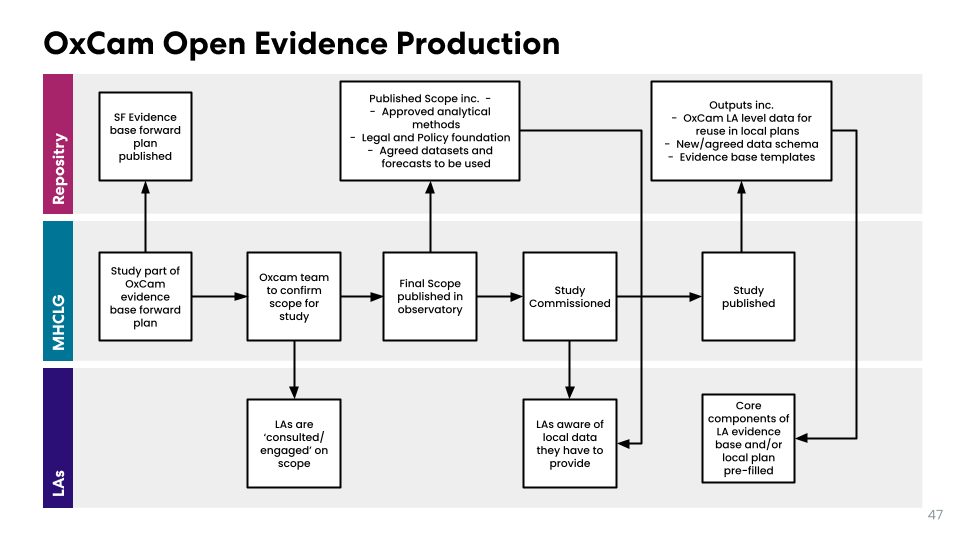Challenge
The Oxford-Cambridge Arc is the area between Oxford, Milton Keynes and Cambridge. It supports over two million jobs for local communities as one of the fastest growing economies in England. The Department for Levelling Up, Housing and Communities (DLUHC) will be focusing on the area’s growth and how they can work with communities and local partners on its development over the next 30+ years.
We supported the team through a data discovery, with a focus on evidence base documents and foundational data that are required to support the OxCam Spatial Framework (the document that will set out where new development is expected) and the local plans of councils.
Solution
One of the biggest challenges in identifying the data most needed to develop the Arc is the volume and diversity of data that’s currently available. Throughout the discovery we wanted to simplify this and find out:
- what data is most useful for important stakeholders in planning across the Arc
- what the barriers are to using that data and turning it into valuable insights
- what the opportunities are for improvement
We identified basic data needs through interviews, analysing survey data and a rapid desk review of frequently used evidence base documents. As a high priority for the development of the OxCam Arc there must be a focus on:
- economy / employment: employment forecasts, GVA forecasts and income and productivity
- infrastructure: list of transport and utilities projects and a mapping of flood zone risks
- housing: household demographic & financial profiles and population forecasts
- environment: strategic land parcels and general areas
We also identified more advanced data needs in a workshop, addressing what data was most needed to make significant strategic and/or investment decisions. These included:
- rates of delivery of housing developments
- current & future capacity of utilities infrastructure
- current site allocations and site developments that might come forward in the medium to longer term
Impact
Research helped us prioritise which datasets used in planning were a priority to be made more consistent and accessible. However, broader issues relating to trust in the data also surfaced, we developed three potential services to be tested at Alpha to address some of these challenges.
Open evidence production
Creating consistency in how evidence base documents are designed, commissioned and published should increase trust and reusability of data. A service for the way evidence base studies are designed, commissioned, created and published, data and methodological standards will be made explicit along the journey.

Evidence repository
Users of central and local government data for planning found it a time consuming and complicated process. Providing core government data, basic foundational local authority data and visualised infrastructure programmes in a single location will mean local authorities and consultants can quickly and cheaply assemble data.
Data and Planning Community of Practice
There’s an enthusiastic and skillful audience of planning and data practitioners willing and able to contribute to the design of data for OxCam. Providing a community of practice will provide a place for better communication, learning and collaboration.
The Oxford Cambridge Arc is a 30+ year project that will require significant investment and coordination between government, local government and the private sector. Making better use of local data is the first step in that development.

IT transformation at Transport for Wales
TPXimpact provided expert IT support services and IT project management to support the growth and development of Transport for Wales.
Read moreOur latest work
Transformation is for everyone. We love sharing our thoughts, approaches, learning and research all gained from the work we do.

Making data more accessible to solve road-based challenges through a National Access Point
Making data more accessible to solve road-based challenges through a National Access Point
Read more
Enhancing data reporting with the UK Health Security Agency
Creating a prototype with the UK Health Security Agency to provide interactive, contextual data that supports better ways of working.
Read more
IT transformation at Transport for Wales
TPXimpact provided expert IT support services and IT project management to support the growth and development of Transport for Wales.
Read more
